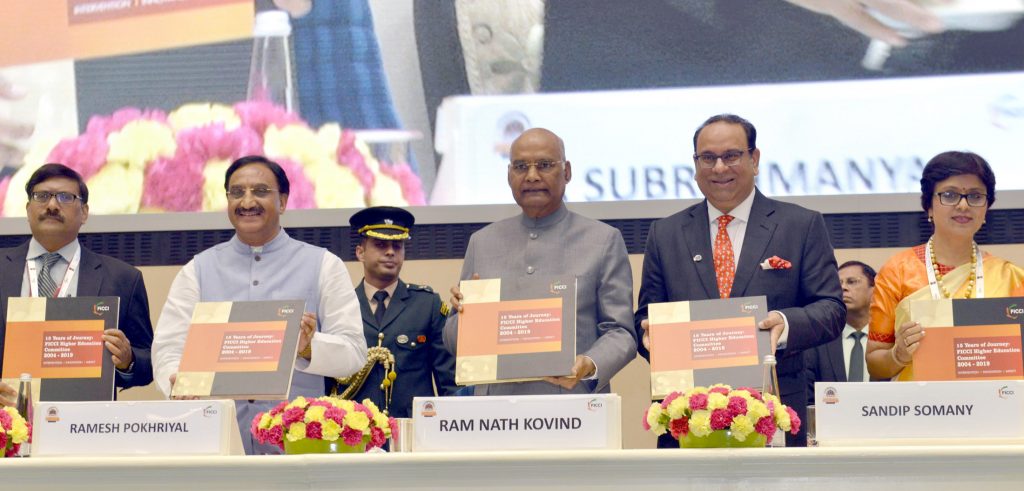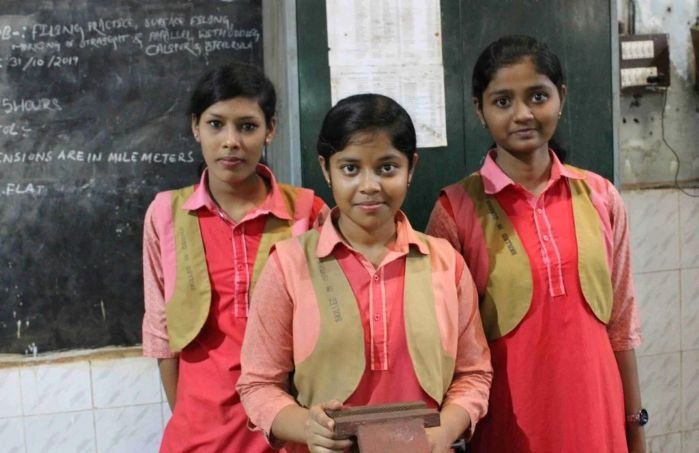

A two-day international conference cum exhibition on higher education by FICCI in New Delhi on Nov 27-28 saw a great response as the plenaries , keynotes, panel discussion discussed several trends in higher education
The annual higher education summit by FICCI, which turned 15 with this year’s edition, has certainly matured and gained stature over the years especially after some senior academicians and leaders have been drafted into FICCI’s Higher Education Committee in recent years, who are playing a pivotal role in drawing themes and linkages. With two key central ministries—Human Resources Development & Ministry of Commerce & Industry lending this event its support, the annual summit has become an important calendar event for higher education in India.
Keeping in view this growing significance, it was only encouraging to see the conference being opened by President of India, Ram Nath Kovind himself, who spoke to over 1500 delegates, 350 foreign delegates from 76 countries and students at the inaugural. India has the third largest scientific human resource in the world and if the country sets up a robust higher education system, it has the potential to become the R&D capital of the world, he stated while adding, “The world of tomorrow will be driven by knowledge, machine intelligence and digital pathways. To prepare ourselves for this transformation and to leverage its limitless opportunities, we have to recast our higher education with new courses and deeper research orientation. Ideation, innovation and incubation should be given primacy in our curriculum.”
He also mentioned higher education has the power to bring about intragenerational change and mobility citing his own example.https://curriculum-magazine.com/we-must-use-modern-tools-to-reopen-wisdom-stored-in-our-countless-knowledge-traditions-president-kovind/
Sandip Somany, President, FICCI, said, “In the era of knowledge economy, human capital will have the greatest impact on socio-economic growth for decades to come. Hence, to become a $5 trillion economy by 2025, India must transform its higher education institutions and universities to meet the 21st century’s needs.”
In his address union HRD Minister Ramesh Pokhriyal ‘Nishank’, while listing the government initiatives particularly work on the new Education Policy, he said that country will have to channelize its youth energy as till 2055 India will enjoy a mean average age of 32 years for its population and therefore we have immense potential to contribute as the human capital of the world.
Dr Vidya Yeravdekar, Chair, FICCI Higher Education Committee, and Pro Chancellor, Symbiosis International University, felt that higher education hasn’t got its due recognition as a catalyst in country’s growth process and it is time to change that mindset because the new economy will be driven more by creativity and innovations where universities can’t be ignored anymore. She said, “Today, nations and economies are growing by channelizing the creativity and innovation in their higher education institutions.”
The conference keynotes stirred a lot of interest as the experts summarized some of the leading and trendsetting initiatives having relevance for universities globally. In particular Prof Peter Stoicheff, President, University of Saskatchewan address on ‘The Crucial Role of Universities in innovation: A Canadian Perspective’ was very futuristic.
An innovative and interesting addition to the conference was a session with spiritual guru, Sri Sri Ravi Shankar of the Art of Living, who had a ‘Fireside Chat’ with T V Mohandas Pai., “Even today, personal guide is essential in education. You need a human touch in the process of learning which not only brings information to students but also builds up their personalities,” guru said. On the role of educators, he said in the mass education process we need human value without which we will not be developed. He said, “The youth is full of energy and if you don’t keep them in the right direction it will become self-destructive.” “Creating a sense of belongingness and sense of responsibility with young people we can dream of giving a better future for the coming generation,” said Sri Sri Ravi Shankar.
The panel discussions again were very informative and brought up diverse perspectives to the understanding of current issues and trend in higher education. In his remarks, Prof N V Varghese, VC of NIEPA, said that achievement gaps are widening and if equalization is one of the objectives of national education agenda, this aspect needs to be addressed. Expressing a similar sentiment, Pramod Nayar, Director Institute of Eminence, University of Hyderabad, said that university education is also about cultural economy. “Questions of policy asked in universities are also questions asked in the nation. These will be questions of social justices, inclusivity, diversity, discrimination, etc. Universities that way are not just pass/fail system but a public pedagogy especially the social sciences classrooms.”
According to Prof Souvik Bhattacharya, VC, BITS Pilani, he personally feels the ranking paradigm is a bit too much. “This kills the incentive to be unique,” he said while adding that not every institution needs to compel itself into doing things where it doesn’t have competence to assemble big ideas or it affects identity.
The debate between specialized and interdisciplinary courses and research presents dilemma for many and Prof Rupamanjari Ghosh, VC, Shiv Nadar University tried to address this by saying that there must core one or two specialization and other disciplines can be like dressing. “You can’t eat IT, you need to have real research in fields such as agriculture, food security and like that. So, focus of universities should be very comprehensive.” It was also mentioned that universities should move from addressing yesteryears problems to addressing tomorrows’ challenges and this will certainly remove some of the criticism that university system faces today.
At the valedictory session, Dr K Kasturirangan, Chairperson, Drafting Committee of the NEP 2019, said that the National Education Policy (NEP) 2019 is not in the context of the regulatory mechanism to control the education. It is lesser regulation but tighter control. “A robust ecosystem of research is relevant today even in the contexts of climate change, population dynamics, biotech, expanding digital marketplace and the rise of machine learning and AI,” add Dr Kasturirangan.
Dr G. Viswanathan, Founder and Chancellor, VIT called for at least 6% of the GDP to be spent on education. “We as a country don’t have national scholarships, which is an aspect not addressed by this policy. While about six lakh students who qualify in NEET want to be doctors, we have created a scarcity of seats, just 60,000, and then these students goto to all sorts of countries outside from Uzbekistan to China, Bangladesh, etc. We are not realizing our potential in raising human capital just not country but for the world.”






